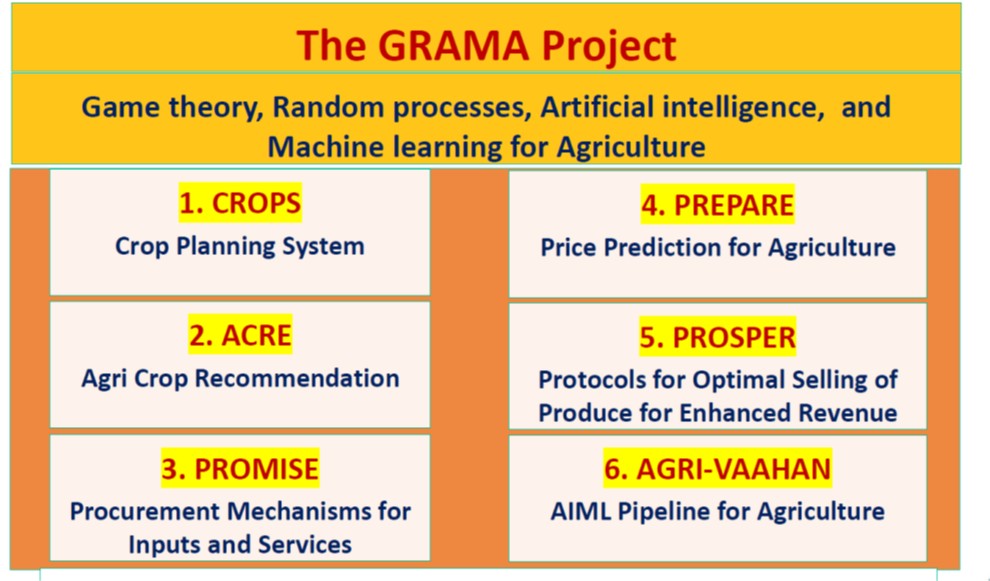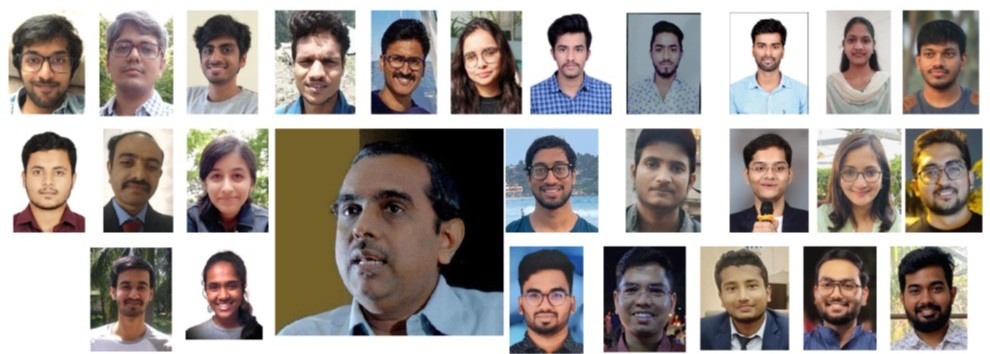The GRAMA Project – Enabling and Empowering Farmers through AI and Game Theory
The agriculture sector contributes to 16% of India’s GDP employing almost 50% of the total work-force. 85% of the farmers are small and marginal, holding less than 5 acres of land and they do not have access to modern technological advances in agriculture. Agriculture in India is much dependent on nature; stochastic climate conditions and more recently global warming make farming both challenging and volatile. Small and marginal farmers continue to be trapped in a vicious circle of low growth, low income, and high debt.
With the above as the backdrop, the GRAMA project is seeking to explore the positive effects of innovative artificial intelligence and game theory based techniques for improving the efficiency of agricultural planning and operations.
The GRAMA project stands for Game Theory, Random Processes, Artificial Intelligence, and Machine Learning for Agriculture.
Collaboration with NABARD
During 2021-2024, we have worked with NABARD (National Bank for Agriculture and Rural Development) through a generous grant to develop and implement novel algorithms and principled solutions to help farmers. These algorithms and solutions are powered by tools from Artificial Intelligence and Game Theory.
Collaboration with BEL
During 2023-24, we have worked with BEL (Bharat Electronics Limited, Bangalore) to run a successful pilot for cost effective procurement of agricultural inputs (seeds, fertilizers, pesticides, etc.) by harnessing the economies of scale provided by farmer producer organisations (FPOs).
Ongoing Work on BharatPaddy
Currently, we are working with Land Optimizer International Private Limited, Bangalore to lay the foundations for BharatPaddy a comprehensive mobile application that could be used by the farmers as a constant companion for decision support for paddy farmers through the entire life cycle from pre-harvest to pro-harvest operations. Here is a conceptual diagram that shows the building blocks in the GRAMA Project.

Crop Planning System (CROP-S)
A mismatch between the crops produced by farmers and the actual market demands could potentially lead to large-scale crop dumping. This regularly leads to huge financial losses and distress to the farmers. To alleviate this problem, we address the macro-level problem of district level or taluka level agricultural crop planning in any given state.
Our interest is in how the Government or any state administration could make a principled recommendation on the crop acreages (number of acres cultivated under each crop) to allocate in which districts or geospatial regions in a given state, so as to match the demand for the crops and maximize the profits for the farmers. CROP-S determines an assignment of crop acreages to districts so as to maximize the profits for the farmers while simultaneously ensuring required crop security levels for each district. CROP-S uses data about predicted demands, transportation costs, soil characteristics in different regions, irrigation constraints, compliance ratios (fraction of farmers who will follow the recommended crop plan), and historical data about yields and prices to arrive at an optimal allocation of crop acreages to districts.
Though a series of M.Tech. projects on this problem, we have worked with district level as well as Taluka level data to produce crop acreage allocations which significantly outperform the existing allocations.
In current work, we are trying to make this problem as close to reality as possible in order to be able to provide policy recommendations to the state governments.
Agricultural Crop Recommendation (ACRE)
A key challenge faced by small and marginal farmers is to determine which crops to grow to maximize their revenues or profits or individual utilities, as the case may be. With a wrong choice of crops, farmers could end up with sub-optimal yields and low, and perhaps even loss of, revenue. ACRE is a tool that implements a principled approach to choose a crop or a portfolio of crops, to maximize the utility to the farmer. ACRE uses available data such as soil characteristics, weather conditions, and historical yield data, and uses state-of-the-art machine learning/deep learning models to compute an estimated utility to the farmer. ACRE’s recommendation system generates several portfolios of crops and ranking them. The technical novelty of ACRE is to use Sharpe Ratio (a risk metric used in financial portfolio selection) to rank various alternate crop portfolios. We have used publicly available data from agmarkne.net portal in India to perform several insightful experiments with ACRE.
Procurement Marketplace for Inputs and Services (PROMISE)
Another key challenge faced by small and marginal farmers is to cost-effectively procure high quality agricultural inputs and services such as seeds, fertilizers, pesticides, and advanced equipment services. Our methodology exploits the economies of scale provided by farmer producer organisations (FPOs).
The idea of PROMISE is for an FPO to collect the requirement of various inputs by individual farmers (through a mobile app) and aggregate this information to decide on the volumes of different types of inputs to be procured. Since the volumes will now be large, one could use competitive techniques such as auctions to bulk procure the inputs from qualified suppliers. This provides an opportunity to obtain attractive volume discounts and also ensures a high quality of inputs since the vendors go through a qualification process.
With the help of Bharat Electronics Limited, Bangalore, we have successfully tested the algorithms developed for this purpose, at two Horticultural FPOs in the vicinity of Bangalore (Rajaghatta and Anekal).
In July 2024, the IISc-BEL Collaborative Project (PROMISE) was selected for a Technology Excellence Award at the India AI Summit in Bengaluru hosted by K-TECH Karnataka and Startup Karnataka.
Crop Price Prediction (PREPARE)
Accurate prediction of agricultural crop prices is a crucial input for decision-making by various stakeholders in agriculture: farmers, consumers, retailers, wholesalers, and the Government. These decisions have significant implications including, most importantly, the economic well-being of the farmers. In this project, our objective is to accurately predict crop prices using historical price information, climate conditions, soil type, location, and other key determinants of crop prices. This is a technically challenging problem, which has been attempted before but much remains to be done.
We first developed an innovative deep learning based approach to achieve increased accuracy in price prediction. The proposed approach uses graph neural networks (GNNs) in conjunction with a standard convolutional neural network (CNN) model to exploit geospatial dependencies in prices. Our approach works well with noisy legacy data and produces a performance that is at least 20% better than the results available in the literature. We are able to predict prices up to 30 days ahead. We have chosen two vegetables, potato (stable price behavior) and tomato (volatile price behavior) and worked with noisy public data available from Indian agricultural markets.
Through a series of M.Tech. projects on this problem, we are able to further advance the state-of-the-art in this research topic. We are currently looking at a variety of techniques combining time series models, large language models, and stochastic point processes to push the boundaries on the problem. E have made progress on two crops where price prediction is the hardest: tomatoes and onions.
Protocol for Selling Agricultural Produce for Enhanced Revenues (PROSPER)
The focus in PROSPER is on designing a mechanism for selling agricultural produce that is attractive to the farmers as well as the customers (buyers). We have started with a mechanism that uses an interesting Nash bargaining formulation which, for a two player seller-buyer game, provides a unique solution that satisfies properties that are desirable to the seller as well as the buyer. In our formulation, the seller is a farmer producer organisation (FPO) acting on behalf of all its farmer members while the second player is virtual aggregated player representing all buyers.
PROSPER first collects (a) the costs incurred (and honestly reported) by the farmers and (b) the strategic bids from the buyers. PROSPER then generates a revised bid vector using a Nash bargaining approach to ensure attractive utilities for farmers and buyers. The key component of PROSPER is a greedy version of the generalized second price (GSP) auction with reserve prices.
KRISHI-X : India Oriented Agri-Advisories with Explainability
KRISHI-X is short for Knowledge-infused Retrieval-Augmented Generation for Indian Agri-Advisories using Simulated Multi-Hop and In-Context Reasoning for Explainability. This uses Retrieval-Augmented Generation (RAG) which enables scalable knowledge infusion into language models at inference time. Since fine-tuning under domain shift can degrade generalisation, retrieval offers a safer and more adaptable alternative. However, standard RAG pipelines struggle with multi-hop reasoning, domain grounding, and explainability – challenges that are critical in domains like Indian agriculture, where expert-verified data is scarce but essential.
KRISHI-X is an explainability-centric agri-advisory system built on a general-purpose Hybrid RAG framework. We have created a curated database with 1,441 expert-verified ground truth query-answer pairs and and a 40,000-pair QA set from 14 state-specific Packages of Practices (PoPs). KRISHI-X improves upon a naive RAG baseline by integrating dense–sparse hybrid retrieval over document chunks and QA pairs, simulated multi-hop query expansion, and a contrastively trained re-ranker aligned with answer relevance.
KRISHI-X logs all intermediate steps to enable modular diagnostics and plans for perquery attribution through a structured modular explainability framework. Evaluated across 13 metrics, KRISHI-X shows strong gains in faithfulness, contextual recall, and factual precision offering a fine-tuning-free, transparent blueprint for deploying trustworthy, region-sensitive AI in domains where traceability is non-negotiable.
We are currently extending KRISHI-X in multiple directions and the final outcome is expected to be a farmer-friendly, high personalised QA system for smallholder farmers.
Enabling Smallholder Farmers Equitable Access to Benefits of Carbon Farming
Agriculture is a major source of greenhouse gas (GHG) emissions. Our work explores how carbon farming can support sustainability of agriculture and the environment, as well as offer new economic opportunities for smallholder farmers. Our proposal is to exploit the economies of scale provided by farmer producer organisations. Toward this end, we have completed a state-of-the art of survey of best practices in carbon farming and carbon sequestration.
In the survey paper that we have completed, we start by explaining the basics of carbon sequestration and carbon farming, focusing on land management practices that improve soil organic carbon. We then describe the important process of measurement, reporting, and verification. Following this, we describe global best practices and illustrative examples of several successful carbon farming projects at the global level. We review the current state of carbon farming projects in India. Next, we explain how carbon markets work, including the difference between compliance markets and voluntary markets. We take a closer look at the most prominent global carbon market, the European Union Emissions Trading System, to understand how carbon markets can be designed effectively. Finally, we highlight key challenges in this area and provide a future perspective.
In our ongoing work, we are exploring how the aggregation provided by farmer producer organisations can be harnessed to provide to smallholder farmers equitable access to the benefits of carbon farming. This has the attractive benefit of making agriculture more sustainable.
Explainability of AI Models for Agriculture using Cooperative Game Theory
The increasing use of AIML models in critical agriculture applications underscores the need for model transparency and interpretability. Many models operate as black boxes raising concerns about trust, fairness, equitability, and accountability. In this project, we are exploring how cooperative game theory offers an explainability framework that addresses some of the above concerns. It is notable that the measure SHAP which is widely used in the machine learning area is based on Shapley value, a prominent solution concept in cooperative game theory.
Beyond the Shapley value, other solution concepts in cooperative game theory such as the Core, nucleolus, Banzhaf index, Gately point, and conflicting claim methods systematically assess feature contributions, enhancing model trust and guiding decisions. This project seeks to integrate cooperative game theory with explainable AI in the context of AI models for agriculture. Ongoing work is striving to develop a holistic explainability index combining the complementary power of various solution concepts in cooperative game theory.
AIML Pipeline for Agriculture Domain (AGRI-VAAHAN)
A wide range of issues in the digital agriculture space have been addressed using AIML techniques. Prominent problems in this space include crop price prediction, crop yield prediction, and crop recommendation. Keeping these problems in mind, we have built a platform, AGRI-VAAHAN which is an extensible AI-ML pipeline to seamlessly integrate the end-to-end activities in agriculture data analysis. Agri-Vaahan is a publicly-accessible web application. It offers a wide variety of data imputation, data cleaning, and data analysis techniques which are especially useful in the context of agriculture data.
GRAMA Research Publications and Reports
- Geetha Charan, V. Priyanka, Rohit P Suresh, Kartik Sagar, Mahanth Yalla, Ravi Trivedi, Yadati Narahari. Harnessing Carbon Farming and Carbon Markets for Enabling Sustainable Agriculture and Empowering Agricultural Farmers. To appear in: Journal of IISc, Special Issue on Digital Agriculture, 2025, Springer.
- Y. Narahari. Enabling Farmers through Game Theory and Artificial Intelligence Based Services. NABARD Research Study – 45, https://www.nabard.org/auth/writereaddata/tender/pub_0402250921181354.pdf
- Y. Narahari and Mayank Ratan Bhardwaj. Enabling Farmers through Game Theory and Artificial Intelligence Based Services. NABARD Research Chronicle. April 2024, pp. 22-34. https://www.nabard.org/auth/writereaddata/tender/2604245734research-chronicle_april-2024.pdf
- Mayank Ratan Bhardwaj, Azal Fatima, Inavamsi Enaganti, and Y. Narahari. Incentive Compatible Mechanisms for Efficient Procurement of Agricultural Inputs for Farmers through Farmer Collectives. In ACM SIGCAS/SIGCHI Conference on Computing and Sustainable Societies (ACM COMPASS) 2022, pp. 696-700.
- Rohit Patel, Inavamsi Enaganti, Mayank Ratan Bhardwaj, and Y. Narahari. A Data-driven, Farmer-oriented Agricultural Crop Recommendation Engine (ACRE). Proceedings of International Conference on Big Data Analytics 2022, Lecture Notes in Computer Science, Springer, pp. 227-248.
- Mayank Ratan Bhardwaj, Bazil Ahmed, Prathik Diwakar, Ganesh Ghalme, and Y. Narahari. Designing Fair, Cost-optimal Auctions based on Deep Learning for Procuring Agricultural Inputs through Farmer Collectives. To appear: Proceedings of 15th International Conference on Automation Science and Engineering (IEEE CASE 2023), Auckland, New Zealand.
- Mayank Ratan Bhardwaj, Jaydeep Pawar, Abhijnya Bhat, Deepanshu, Inavamsi Enaganti, Kartik Sagar, and Y. Narahari. An innovative Deep Learning Based Approach for Accurate Agricultural Crop Price Prediction. To appear: Proceedings of 15th International Conference on Automation Science and Engineering (IEEE CASE 2023), Auckland, New Zealand.
- Mayank Ratan Bhardwaj, Abhishek Chaudhary, Inavamsi Enaganti, Kartik Sagar, and Y. Narahari. A Decision Support Tool for District Level Planning of Agricultural Crops for Maximizing Profits of Farmers. To appear: Proceedings of 15th International Conference on Automation Science and Engineering (IEEE CASE 2023), Auckland, New Zealand.
GRAMA Ph.D. Thesis
Mayank Ratan Bhardwaj. Novel Algorithms for Improving Agricultural Planning and Operations using Artificial Intelligence and Game Theory. Department of Computer Science and Automation (Advisor: Y. Narahari). July 2023.
GRAMA M.Tech. Projects (Completed)
- Madhura Rajesh Shanbag. KRISHI-X : Knowledge-infused Retrieval-Augmented Generation for Indian Agri-Advisories using Simulated Multi-Hop and In-Context Reasoning for Explainability. M.Tech. Project Report. Department of Computer Science and Automation, Indian Institute of Science, June 2025.
- Jayanthi Sai Pranathi. Explainability of Machine Learning Models using Cooperative Game Theory. M.Tech. Project Report. Department of Computer Science and Automation, Indian Institute of Science, June 2025.
- Kharat Rohit Sunil. A Decision Support Tool for Optimized Crop Planning at the District Level and Taluka Level Incorporating Irrigation and Soil Parameters. M.Tech. Project Report. Department of Computer Science and Automation, Indian Institute of Science, June 2025.
- Samip Poudel. Improving Price Prediction of Price-Volatile Crops using Deep Learning and Large Language Models. M.Tech. Project Report. Department of Computer Science and Automation, Indian Institute of Science, June 2025.
- More Jayadeep Sudhakar. FOLIAGE: Forced Optimization on Leaf Images for Agricultural Gradient Explanations. M.Tech. Project Report. Department of Computer Science and Automation, Indian Institute of Science, June 2025.
- Geetha Charan. Agri-Vaahan 3.0: AI-ML Pipeline for Agriculture. M.Tech. Project Report. Department of Computer Science and Automation, Indian Institute of Science, June 2024.
- Anand Nakat. Improving agricultural crop recommendations with deep learning based crop price prediction. M.Tech. Project Report. Department of Computer Science and Automation, Indian Institute of Science, June 2024.
- Vithule Prashanth Munna. CROP-S: A decision support tool for acreage planning of agricultural crops for maximizing farmer welfare. M.Tech. Project Report. Department of Computer Science and Automation, Indian Institute of Science, June 2024.
- Kambe Sahil Suresh Surekha. Agri-LLaMA: A Fine-tuned, Multi-hop, Retrieval Augmented Generation based Large Language Model for Indian Agriculture. M.Tech. Project Report. Department of Computer Science and Automation, Indian Institute of Science, June 2024.
- Abhishek Kumar Chaudhary : CROP-S: A Decision Support Tool for Acreage Planning of Agricultural Crops for Maximizing Profits of Farmers. M.Tech. Project Thesis. June 2023
- Chaitanya Chennam: PROSPER : Protocol for Optimal Selling of Agricultural Produce for Enhanced Revenue. M.Tech. Project Thesis. June 2023.
- Kaushik Kukadia: Agri-Vaahan 2.0: AI-ML Pipeline for Agriculture. M.Tech. Project Thesis. June 2023.
- Kishan Mittal: ACRE 2.0: Agricultural Crop Recommendation for Farmers. M.Tech. Project Thesis. June 2023.
- Jaydeep Pawar: Using Geospatial Information and Improved Deep Learning Methods for Crop Price Prediction. M.Tech. Project Thesis. June 2023.
- Sneha Negi: Designing Fair, Cost-optimal Combinatorial Auctions based on Deep Learning for Procuring Agricultural Inputs. M.Tech. Project Thesis. June 2023.
- Meghnath Singh (M.Tech (AI) Student). Yield and Grade Prediction for Horticultural Crops using Visual Analytics. M.Tech. Project Thesis. June 2022
- Deepanshu (M.Tech (CSE) Student). Improved Methods for Agriculture Crop Price Prediction.M.Tech. Project Thesis. June 2022
- Rohit Patel (M.Tech (CSE) Student). ACRE: Agriculture Crop Recommendation Engine.M.Tech. Project Thesis. June 2022
- Azal Fatima (M.Tech. (CSE) Student). Mechanism Design For Efficient Procurement of Agricultural Inputs for Farmers.M.Tech. Project Thesis. June 2022
- Sowjanya Pidathala (M.Tech. (AI) Student) and Vaidehi Bhaskara (Research Intern). AGRI-VAHAN: An AIML Pipeline for Agriculture.M.Tech. Project Thesis. June 2022
- Someshwar Arnoorla (M.Tech. (AI) Student). Agricultural Crop Price Prediction using Transformer Encoder Based Wide and dep Networks.M.Tech. Project Thesis. July 2021
GRAMA Interns
- Kodur Sai Vinay Sathvik. Crop Price Prediction. 2025
- Rohith Suresh. PES University. BharatPaddy App for Paddy Farmers. 2024-25.
- Sanath Patil. Ramaiah Institute of Technology. Price Prediction.
- Abhijnya Bhat, PES University. Price prediction and crop recommendation.
- Vishisht Rao. PES University. Input Procurement Mechanisms and Marketplace for Selling Agricultural Produce.
- Prathik Diawakar. UG Student, IISc. Input Procurement Mechanisms
- Hritik Bana. IISER-Bhopal. Price prediction.
GRAMA Team



